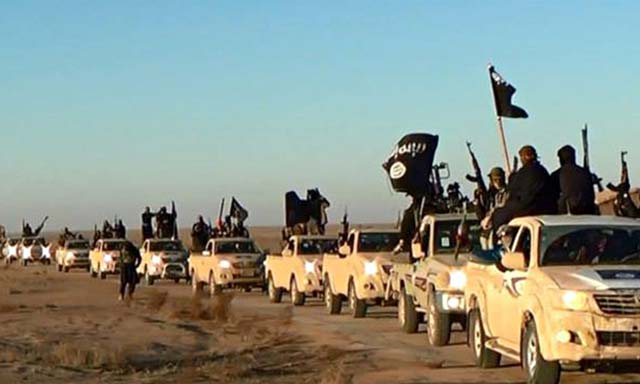The self-styled Islamic State in Iraq and Levant (ISIL) poses a threat to Afghanistan as it has ushered in practicing their fundamental ideology – i.e. imposing strict rules on women, killing tribal elders, etc. – and made inroads. There are reports that ISIL holds sway in 25 provinces and seeks to further extend its sphere of influence. Moreover, the emergence of the Islamic State (IS) group has led to splinter party among the warring factions as a number of Taliban militants pledged allegiance to it. Perhaps, the IS intends to outdo the Taliban insurgents and spearhead terrorist attacks in Afghanistan.
The “war on terror” did not bear the desired fruit within the last decade. In spite of counter-terrorism strategies, the Taliban are able to carry out deadly attacks across the country. Their strong assaults in Faryab, Kunduz, Helmand and many other provinces demonstrate their influence. The Kunduz takeover was the militants’ biggest victory since the Taliban government was ousted in 2001. After all, the Taliban are backed by Haqqani network, al-Qaeda and Lashkar-e Tayyeba – whose commanding officer Harris was purportedly killed in Kunduz province by Afghan soldiers just few days ago. Now, the IS has also gained a shaky foothold in restive parts of the country, which is a note of caution for the government. In short, Afghanistan is highly prone to war and violence following the withdrawal of foreign forces.
“The fact that the Taliban can actually take the sixth largest city in Afghanistan, and hold it for a couple of days, sends a signal to the government and the international community about the future of Afghanistan,” said David Sedney, a former deputy US Assistant Secretary of Defense for Afghanistan and Pakistan. He added, “The Afghan government doesn’t even have a defense minister after one year of unity government. This is a government that needs to get down to business and not just talk about having a better security situation.” He pointed out as, “Afghan soldiers are great fighters ... They’re willing and able to fight but they need a good leadership.”
The world has realized that the withdrawal of NATO soldiers has precipitated militancy and threat posed by IS group in Afghanistan. Addressing the Summit on Countering ISIL and Violent Extremism at the United Nations, Barack Obama said, “We’re pursuing a comprehensive strategy that is informed by our success over many years in crippling the Al Qaeda core in the tribal regions of Afghanistan and Pakistan.” He said the US was harnessing all its tools to combat the extremists. Obama reiterated, “This is not going to be turned around overnight because it is not just a military campaign that we are involved in. There are problems that have built up over decades that are manifesting themselves in organizations like ISIL.”
In recent weeks, IS in Afghanistan has regrouped, wreaking havoc among Nangarhar’s communities, barbarically murdering tribal elders, clashing with the Taliban, imprisoning families and enforcing strict rules on women. Afghan security forces are reacting but remain overstretched due to operations against strong Taliban offensives elsewhere.
Franz-Michael Mellbin, a Special Representative of the European Union in Afghanistan, writes, “For now, the overall conclusion is that IS does not yet represent a significant strategic threat to Afghanistan. What it has become is a complicating factor politically, as it affects how government actors and other insurgent groups formulate policies, including towards peace talks. For that reason, IS in Afghanistan must be countered. And fast.”
It is believed that if the counterinsurgency proves abortive, the scenario of Iraq and Syria will occur in Afghanistan. The fundamental practices of ISIL remain no mystery for the world. The ethnic minority groups suffer serious discriminations and despicable deeds enforced by the IS militants – which highly outrage the world’s conscience. In other words, the IS sow the seeds of racism and sectarian violence in the soil of Iraq and Syria and discriminate them on the basis of race, religion, creed and sex. Based on its radical ideology, ISIL has gone about systematizing rape, sexual assault and slavery by embedding the buying, selling and gifting of slaves into a system of rewards for its fighters. Of the estimated 3,500 Yazidi women held by ISIL, survivors report being interrogated and in some cases stripped for sorting and categorizing. They have been rated according to desirability, labeled and transported across ISIL-held territory. They have been traded between fighters, and awarded by leadership as prizes.
The stronger foothold of ISIL group will pave the way for the same scenario in our land. A spark of sectarianism, such as abducting and killing ethnic minority group in recent times, seems to be the product of the IS’s presence in the country. No ethnic group will be immune to the poison spewed forth by IS insurgents. Moreover, it is self-explanatory that the IS group seeks to consolidate its presence in Afghanistan so as to fish in troubled water and hunt its prey in restive parts of the country – it will threaten the fragile political structure and democratic system. Afghanistan, where religious tolerance is practiced among the nation to a high extent compared to many Islamic countries such as Pakistan, Iraq, Syria, Saudi Arabia, etc., must not be let fall into room for sectarian and racial violence – as hands are working behind the veil with this sinister intention. Strong counterinsurgent strategy is needed to tackle the issue.

